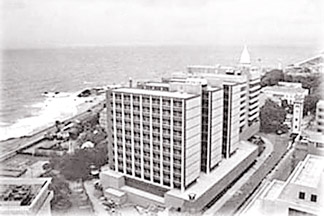|
EPF, ETF investments:
Policy guidelines followed - Dr. Amunugama
*Stock markets around the world facing
downturn
*No risk of EPF incurring any real losses
|

International Monetary Cooperation Senior Minister Dr. Sarath
Amunugama |
Investment policy guidelines were followed when monies of the
Employees Provident Fund (EPF) and Employees Trust Fund (ETF) were
invested, International Monetary Cooperation Senior Minister Dr. Sarath
Amunugama said in Parliament last week.
He made this observation in response to a special statement by
Opposition Leader Ranil Wickremesinghe under Standing Order 23(2) in
Parliament.
The Minister said: “I wish to give a comprehensive reply to the
matters raised by the Leader of the Opposition. The EPF has authority to
make investments in the stock market.
“The EPF Act Section 5(I)(e) states that the Monetary Board may
invest the monies of the Fund in such securities as the Monetary Board
may consider fit and may sell such securities.
“The EPF has also consistently maintained that all its investments
have been made in line with the guidelines issued from time to time by
the Monetary Board. Further, in response to recent allegations, the EPF
once again issued a press release on June 6, 2012, where it reiterated
that it has followed investment policy guidelines.
“The EPF investing team and the Department is completely independent
of the Bank Supervision Department. In the same way, the EPF is
independent of the Public Debt Department as well. As is well known,
about 93 percent of EPF funds are invested in government securities
which are issued by the Public Debt Department, while only a very small
fraction of EPF funds have been invested in banking shares quoted in the
Stock Exchange. In both instances, the EPF maintains integrity and is
not privy to any information that can have a material bearing on a
bank’s share price. Accordingly, there have been no instances of
conflict of interest or insider trading at any time.
Overall guidelines
 “The Monetary Board has provided overall guidelines for investment
and within such guidelines, the Investment Committee is permitted to
take collective decisions in relation to its choice of investments. As
has been explained on several occasions, the EPF has invested around 93
percent of its funds in government securities, and around six percent in
the stock market. “The Monetary Board has provided overall guidelines for investment
and within such guidelines, the Investment Committee is permitted to
take collective decisions in relation to its choice of investments. As
has been explained on several occasions, the EPF has invested around 93
percent of its funds in government securities, and around six percent in
the stock market.
“The balance one percent has been invested in corporate debentures
and short-term government securities. The investments in the stock
market are made with a long-term focus to generate profit and enhance
the Fund’s capital base over the longer term.
“In that exercise, the EPF considers, inter alia, the intrinsic value
of shares of companies and their longer term outlook, the possible
enhancement of share value in the medium to long-term, the company’s
governing structures, future plans, the quantity of shares available of
such companies, the viability and growth potential of the relevant
industry and the possible impact of the growing economy on the company.
“Further, as is practised by many large long-term funds all over the
world, the EPF maintains its equity portfolio as a pool of investments,
which comprises a varied collection of stocks representing key sectors,
including banking and finance, diversified holdings, oil-based
enterprises, healthcare, land and property, telecommunication,
plantations, power and energy, tourism and leisure, trading and
manufacturing.
|

Central Bank of Sri Lanka |
“In the case of equity investments, it must be noted that the
performance of different companies and the market values of the shares
of companies within the portfolio at different times, depend on global,
economic, political, financial, sector-specific and company-specific
factors. In that background, companies as well as the entire share
market does not perform uniformly, nor does the market prices of shares
continue to rise at all times.
External factors
“Accordingly, there may be times during which the value of certain
stocks could be lower than the cost, but such situations are almost
always reversed when external factors change for the better, over time.
Therefore, it is in that background that the diversification of the EPF
equity portfolio has been done, so that the fund value will yield
above-average results, over the longer term.
“To support this investment decision-making process of the EPF, a
team of professional and well-qualified staff assess and recommend the
investment opportunities from the point of view of the several aspects
as enumerated above and thereafter such recommended investments are
approved by the high level Investment Committee and finally ratified by
the Monetary Board.
Therefore, a dynamic and diligent process is followed, so as to
ensure that the investments are made with care, so as to safeguard the
Fund and ensure its profitability, stability and growth.
“In each of the decisions to invest in the shares of company, the
Investment Committee has been guided by extensive research which has
indicated that these shares have potential for long-term growth and
enhancement in value.
“Such research is available at the EPF for perusal by any authorised
person, including the Auditors.
“What is currently experienced in the Colombo Stock Exchange (CSE) is
a bearish trend in the market, where prices of all shares are trading at
considerably lower rates than those that prevailed several months ago.
This is not an unusual phenomenon today, with almost all stock markets
all over the world experiencing downturns.
“It should also be stated that the pragmatic policies of the EPF has
resulted in the EPF recording substantial gains. The EPF has realised
Rs. 2,504 million as capital gains and dividends in 2011 and over Rs.
1,559 million as capital gains and dividends, so far in 2012.
Equity portfolio
“In fact, at the time when CSE’s All Share Price Index (ASPI) reached
a peak in the latter part of 2010 and early 2011, the EPF equity
portfolio recorded a huge unrealised capital gain of Rs. 19 billion.
Nevertheless, even in the face of such gains, the EPF was of the view
that it would be more advisable to retain such stocks in its portfolio
over the longer period, considering the probable gains that such
portfolio could generate in the longer term, when the country’s economy
grows substantially over the next four to five years.
“The EPF categorically rejects the statement allegedly made by an
Opposition Member of Parliament as reported in several newspapers on May
15, 2012, where the EPF has been accused of fraudulent transactions in
the stock market.
“Such statements, read in conjunction with several past statements of
a similar nature, seem to be designed to systematically discredit the
EPF and discourage its investment activities.
“It is clear that an attempt is being made to attack the EPF with
malicious statements, taking advantage of the temporary bearish
environment of the stock market, where almost all investors are
experiencing a downward trend in their investment valuations and where
some investors are compelled to take losses particularly due to calls on
their margin accounts.
“However, as is quite normal in all stock exchanges in the world, the
large-scale institutional investors have the capacity and the ability to
hold onto their portfolios without having to dispose of their
investments during a downward trend in the market and in Sri Lanka where
the EPF is clearly one of the largest institutional investors, the EPF
will act in a similar manner. Hence, there is clearly no risk of the EPF
incurring any real loss during this bearish phase of the stock market.
“In these circumstances, the EPF wishes to reiterate that its
portfolio of stocks has intrinsic value and therefore would hold onto
certain stocks where the market values may have temporarily reduced
below cost, because such stocks have the potential to yield satisfactory
dividends and also make substantial gains when the ASPI moves up in due
course.
No fraudulent transactions
“The EPF also wishes to emphatically state that no fraudulent stock
market transaction has ever been made by the EPF and that all
transactions have been carried out with utmost care, diligence and
professionalism. Further, all EPF transactions including its investments
are audited by the EPF’s internal auditor, which is a reputed audit
firm, while in terms of Section 6(1) of the EPF Act No. 15 of 1958, the
annual financial statements of the Funds are audited by the Auditor
General.
“In that context, the financial statements for 2012 have been audited
by the Auditor General and the Annual Report of EPF for 2010 together
with the Auditor General’s report has already been published. In such
Annual Report, information on stock market investments, comprising the
investment portfolio and trading portfolio, has been published where the
names of companies, value of shares and year-end market values have been
disclosed as is required by the Accounting Standards.
“At the same time, the financial statements for 2011 have been
submitted for audit to the Auditor General by February 2012 and the EPF
has published such unaudited income statement and the balance sheet in
the newspapers in early May 2012, for the information of its
stakeholders.
“The EPF also wishes to state that as a result of its prudent
investments and sound management, it has been able to declare an
impressive rate of return of 12.5 percent in 2010 and 11.5 percent in
2011. Such rates of return are substantially above the interest rates
applicable to normal deposits in the financial market during the
respective periods. Further, the EPF is confident that its sound
investment decisions will be proved pragmatic, sensible and profitable
over the longer time-frame.
“In all instances where direct answers were not given, the
information requested has been with regard to individual stock market
transactions which are sensitive and where disclosing such information
would be detrimental to the Fund’s investment strategy.
Investment analysis
“The management information and investment analysis prepared by the
EPF for its own research and its future investment strategies are its
confidential and valuable intellectual property and disclosure of such
information would enable competitive investors to benefit by the
strategies implemented by the EPF’s investment team. Hence, the
disclosure of such information has been considered detrimental to its
own operations and consequently to its members.
“The purchase of shares of companies is made by the EPF with a
long-term view to generate profit in the future, considering the
intrinsic value of shares of such companies and its long-term future
outlook. At the same time, in certain other instances, the EPF may not
purchase shares of certain companies which may not be due to an inherent
weakness of the company, but due to EPF’s own investment strategy at a
given point of time. However, these different investment strategies of
the EPF may be misinterpreted by outsiders, without in-depth knowledge,
who may only look at the buying and selling of shares by the EPF,
without understanding or appreciating the underlying rationale of the
particular investment decision, at the particular time.
“Information on stock market investment of the Fund is published in
the Annual Reports of the EPF where the names of companies, value of
shares and year-end market values are made available for the information
of the general public. This is the type of information that is disclosed
by all fund managers, both nationally and internationally and there
would be huge damage caused to the EPF and the Colombo Stock Exchange,
if this normal disclosure principle is departed from, by the EPF.
“When day-to-day transaction details of the EPF investments are made
available, different individuals may also interpret the information in
various ways (with after-acquired information as well) and as a result,
they may also attempt to tarnish the image of the Fund and the Central
Bank in particular and the government in general.
Political ends
“Some people may also attempt to use such information to discredit
the Central Bank and the government, to support their own political ends
as well. The fact that such Parliamentarians have been silent when the
stock market was making gains and when the EPF had made unrealised gains
of over Rs. 19 billion at a particular time, is clear evidence of their
true intentions.
“In this regard, the Opposition members have singled out a few share
investments where the values have come down and are basing their
argument on such reduction in value. However, it must be appreciated
that the EPF is not a “hedge” fund where investments are made mainly for
short-term gains, but is a Fund that makes investments with the
intention of realising long-term gains.
“In an era where interest rates are likely to decline in the medium
to long-term, the EPF has taken the view that returns from investments
in government securities and debt instruments only, would not provide
sufficiently high returns across such a long-term time horizon.
Therefore, the need to diversify the EPF investment portfolio has been
considered important, while maintaining the overall safety and stability
of the Fund. In that background, over the recent part, the EPF has made
several investments in various listed corporates through the Colombo
Stock Exchange and also in selected unlisted corporates, on the basis
of, inter alia, intrinsic value of the company, its growth prospects,
the possible enhancement of share value in the medium to long-term, its
governing structures, the viability and prospects of the industry, the
quantity of shares available, the future plans and the impact of the
growing economy on the company.
“Such shares in various corporates have been gradually accumulated
over the past several months in a methodical and professional manner.
Other than in the case of a comparatively fewer transactions within the
smaller trading portfolio (which has also yielded capital gains of
several hundred million rupees), the larger portion of the share
acquisitions over the recent past has been made with the intention of
holding over the medium to longer period.
Bullish trend
“That is why even at the height of the bullish trend of the share
market when the ASPI reached its peak in the latter part of 2010 and
early 2011 resulting in significant unrealised gains in the EPF
long-term portfolio of over Rs. 19 billion, the EPF Investment Committee
took the view that it would be best to hold those stocks in its
portfolio over the longer period, since it was considered likely that
the gains in the longer time frame would be substantially higher than
the unrealised gains that were recorded at the last peak of the market.
“In that background, the current concerted effort to highlight the
decreases in values of certain selected stocks in the wide portfolio of
the EPF during the period of a temporary slump of the market is
obviously a mischievous endeavour carried out by certain persons who are
guided by ulterior motives, to discredit the EPF to further their own
agendas. “The EPF is confident that its sound investment decisions will
be proved pragmatic, sensible and profitable over the longer time frame.
I will now turn to the ETF. I wish to inform that under the ETF Act No.
46 of 1980 Section 8 (d) the ETF Board is empowered to conduct
day-to-day investments including share operations.
“Under Section 9 of the same Act, Cabinet approval is obtained only
if the ETF Board acquires a controlling interest of an enterprise.
“As at June 18, 2012 the total investment portfolio is Rs. 140
billion out of which Rs. 1306 million (92.95 percent) is invested in
State Sector Investments, while Rs. 8.3 billion (5.88 percent) is
invested in shares. Further, I wish to inform that according to a Board
decision, ETF can invest only up to a maximum of six percent of the
investment portfolio in shares.” |

